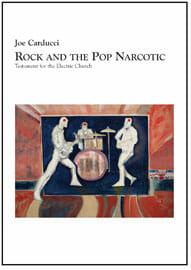
Hailing the Heavy: Screed for the Ages as Relevant as Ever
In 1990, Redoubt Press released Rock and the Pop Narcotic like a shot of Raid into a hornet’s nest of received wisdom and unquestioned assumptions about the Meaning of Rock, unleashing a buzz of critical hosannas, unqualified opprobrium and everything in between. Joe Carducci’s 500-page missive is the work of a true iconoclast, sporting the kind of smart, cranky prose that made the likes of Richard Meltzer and Nick Tosches such a joy to read in the heyday of the Noise Boys. Simon Reynolds called it “a riveting blend of rigor and dry wit.” Rock historian Clinton Heylin included not one, but two excerpts in his Penguin Book of Rock and Roll Writing, remarking, “Rock and the Pop Narcotic … may well be the most important critique on rock music written in the last 10 years.” Many who objected to Carducci’s aggressively right-wing libertarian slant, and liberal (illiberal?) use of such inflammatory epithets as “fag” and “faggy,” grudgingly acknowledged the force of Narcotic’s whiplash style, which can move from scatological dumpster-diving to ivory-tower theorizing in the same sentence, all the while weaving together a near-exhaustive Grand Unified Theory of Rock. (GUTR? I like that.) With the release of Nirvana’s Nevermind just one year after the book’s initial publication, Narcotic’s advocacy of guitar-based hard rock seemed not merely “important” but “prophetic.”
Out of print for a number of years after Henry Rollins published a second edition on his 2.13.61 imprint in 1994, Redoubt’s re-release offers not much in the way of additional content beyond a new cover and brief introduction. While it’s nice that folks will no longer have to slog around the web or pay anywhere from $50 to $250 for a copy, it’s disappointing not to hear Carducci’s trenchant critical voice address the musical events of the last decade. Contemporary topics ripe for Carducci ruminations are legion: Garage-rock revivals, The White Stripes, American Idol, My Morning Jacket and Clear Channel are just a few of the softballs I’d love to see lobbed his direction.
But Carducci never styled himself as a full-time cultural critic. Narcotic is a personal document as much as anything else—the result of 10 years spent in the music-industry trenches, with a solid stint at SST—home of such seminal bands as Black Flag, Husker Dü and The Minutemen. This gives Carducci a fingertip feel for the music and its culture that’s missing from similar genre-defining attempts by academics like Martha Bayles’ Hole in Our Soul or Robert Pattison’s The Triumph of Vulgarity. His acquaintance with historical details comes firsthand rather than through research, and he speaks with the passion of a man defending his own turf. More remarkable, Carducci does high theory every bit as well his academic counterparts. He pulls together sociological, historical and, yes, philosophical angles with the kind of casual audacity and broad sweep that would send most people’s bullshit detector into the redline; but he does it with a maddening amount of nuance and solid reasoning, making it nearly impossible to pinpoint exactly where he goes wrong. The scary thing is, he rarely does.
The central conceit of Narcotic is straightforward: rock is a legitimate experiment in musical effect that has been consistently undermined by the twin forces of, on the one hand, commercial pressure on bands to “lighten” their sound in a danceable pop direction (Phil Spector/Tin Pan Alley), and on the other hand, a rock-journalism establishment less concerned with music than with political agendas, ad revenues and (in the case of most American critics) Europe envy. Driving this critique is a definition of rock and a companion aesthetic to match. “Rock,” says Carducci, “is rock and roll made conscious of itself as small band music.” That is to say—as rock ’n’ roll moved out of the lighter ’50s (Holly, Presley) and into the denser sound of the pre-British Invasion ’60s (Paul Revere, Link Wray) a musical idea emerged: through experimentation in jam sessions, rock could be pushed into the realm of The Heavy, an ineffable quality akin to the jazz idea of Swing, only packing a great deal more dread and ballast. At the core of it all is an anthropology—a view of human nature—so brief and subtle it’s easy to miss. The urgent foreboding of The Heavy resonates, argues Carducci, because ours “are higher aspirations driven by carnal desires.”
Narcotic isn’t an easy read. It’s dense. Carducci tends to ramble, and large portions cry out for an editor’s red pen. But the argument builds momentum like a slow-motion avalanche; its multi-layered, ambitious scope makes it a book to re-read, to argue with and respond to for anyone who cares about music and its relationship to culture. Even if you can’t buy into Carducci’s ideal musical universe (Sabbath, but no Replacements; Free, but no Big Star), it remains one of the few, if not the only, visions of Rock that anchors the music’s legitimacy to an idea other than kitsch, politics or hedonism. At a time when Rock’s identity has never been more tenuous, Rock and the Pop Narcotic feels more relevant than ever.